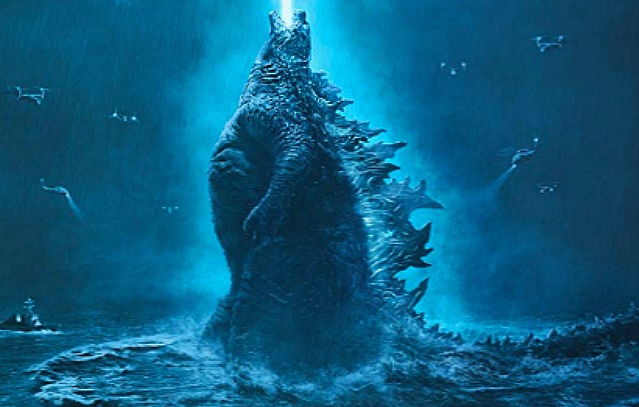Boilerplate: “Rambo T. Geezer travels to Mexico to save a friend’s daughter who has been kidnapped by the Mexican cartel.” Sylvester Stallone in the Gibson role; costarring Adriana Barraza, Paz Vega, Yvette Monreal, Sergio Peris-Mencheta. Directed by Adrien Grunberg, cowritten by Stallone and Matt Cirulnick.
 Jeffrey Wells
Jeffrey Wells
“Mad Men” Needed A Putney Swope-Type Character
Boilerplate: “Assuming he is incapable of winning, all of the members of a prestigious Madison Avenue advertising firm accidentally vote to appoint the company’s only black executive, Putney Swope, as chairman of the board. His unexpected win behind him, Swope changes the company’s name to ‘Truth and Soul, Inc,’ fires nearly all of its elderly white employees, and focuses solely on creating subversive, outlandish, and shocking campaigns.
“As the company is catapulted to new heights of success, Swope finds that he has drawn the ire of the U.S. President, who seeks to declare him and his renegade staff a threat to national security.
“Considered one of the masterpieces of late 60s counterculture cinema, Robert Downey, Sr.‘s Putney Swope remains a vital cinematic satire on race, politics and pop culture. Featuring a supporting performance from Allen Garfield (The Candidate, Nashville) and a cameo from Mel Brooks, Vinegar Syndrome is proud to present the Bluray debut of this landmark 1969 film in a stunning 4K restoration created by The Academy of Motion Picture Arts and Sciences and The Film Foundation.”
The Swope Bluray pops on 7.2.19.
Morrison’s Legacy Is Still Recovering From “The Doors”
A new “final cut” 4K Bluray of Oliver Stone‘s The Doors (’91) pops on 7.27.
Am I a huge fan of this film? No. Do parts of it work? Yes. I felt intrigued and diverted during an initial screening. The early Doors music carried me along and the acid-tripping scene in the desert was quite the stand-out. Robert Richardson‘s cinematography accurately recreated the off-center, crystalline, almost spooky atmosphere that a psychedelic adventurer might visually encounter.
But overall the film seemed to weaken and even fall apart upon my second viewing.
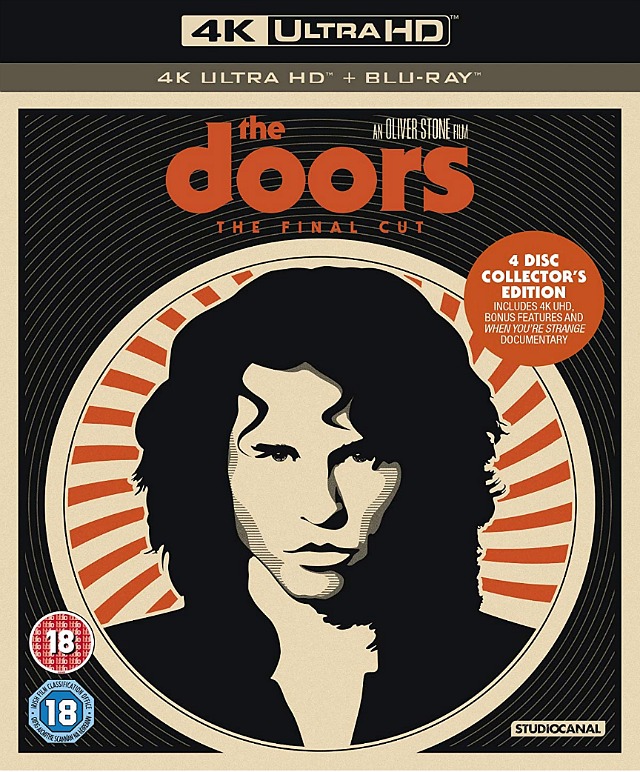
The main reason is that I felt more and more alienated by Stone and Val Kilmer‘s portrayal of Jim Morrison as a coarse loutish type (party-animal, screamer, show-off, indelicate). To hear it from Doors keyboardist Ray Manzarek and others who knew Morrison well, there was a lot more to the guy than just climbing chain-link fences, whipping his schlong out during a concert or two and acting like a bellicose asshole.
For at least a three-year period (early ’65 to ‘early ’68) Morrison gave every indication of being a solemn poet and spiritual adventurer — a guy who had apparently tasted serious satori. Morrison’s song lyrics from that period clearly indicated he’d broken through to Aldous Huxley‘s “other side”. He was like a new Arthur Rimbaud.
The Doors’ first two albums, The Doors and Strange Days, offered abundant indications of this mystical bent among Morrison and his bandmates, but did Stone and Kilmer take heed?
Yes, Morrison allegedly became a dispirited, dissolute alcoholic during the last couple of years (the beard, the weight gain, Morrison Hotel, L.A. Woman, the final few months in Paris before his death at age 27) but I decided after my second viewing that Stone and Kilmer had blown it by dismissing the delicate threads in Morrison’s soul during that ’65 to early ’68 period. Stone encouraged Kilmer to act the part of a rock ‘n’ roll animal and he certainly nailed that aspect, but in so doing they made Morrison into a tiresome figure.
“Russia Helped Me To Get Elected”
This is the way liars admit the truth, by blurting out words in passing or more precisely a clause within an otherwise lying, agitated, bloviating, diarrhea-mouth denial. In other words, when it comes to sociopaths the truth will only leak out accidentally. As in “oops…uhm, I didn’t mean that.”
This is what happened this morning to Donald Trump, tweeting that Russia had helped get him elected in ’16. An hour later he retracted the statement — “No, Russia did not help me get elected…I got me elected.” But the milk had been spilt.
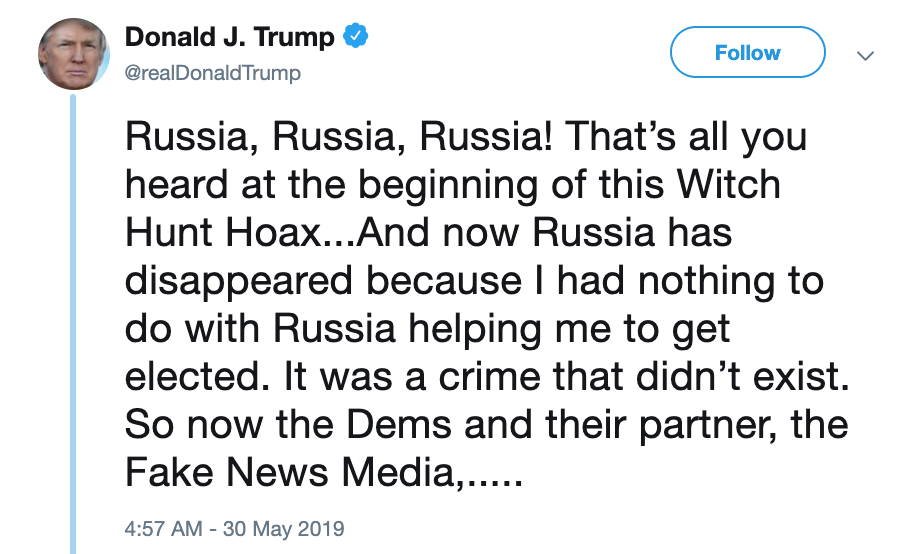
DeNiro to Mueller
In a just-posted open letter to Robert “leave me alone” Mueller in the N.Y. Times, Robert DeNiro (who’s been playing Mueller on SNL for several months) begs him to stop behaving like a loyal (i.e., not overly confrontational) Republican and stand up for America. A significant portion of the public is too lazy and mind-scattered to read the Mueller Report, DeNiro has written, but if straight-arrow Mueller is able to man up and explain his findings (and, perhaps more importantly, convey his fully-considered beliefs about the character of Donald Trump) he’ll be doing this once-great nation of ours a favor.
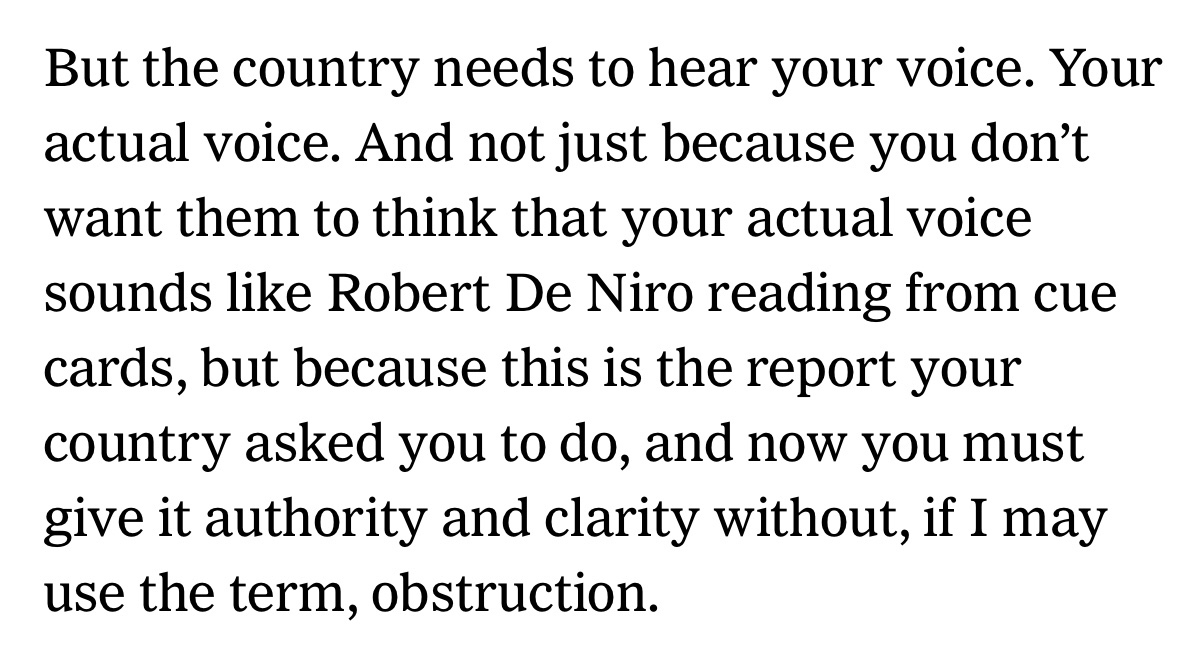
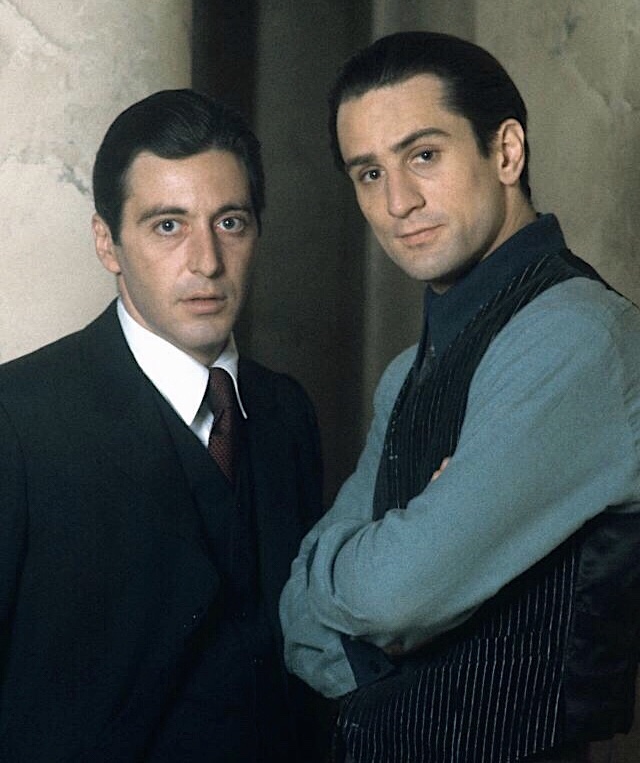
Feels All Whipped Up
I’m getting an Extremely Loud & Incredibly Close vibe from this trailer for John Crowley‘s The Goldfinch (Warner Bros., 9.13). I tend to have difficulty with trauma-recovery dramas, especially those involving terrorism. And I have to be honest — I don’t like sensitive little boys who wear glasses. I’m just saying.
Based on Donna Tartt’s 2013 novel, and set for release during the Toronto Film Festival. Ansel Elgort, Oakes Fegley, Aneurin Barnard, Finn Wolfhard, Sarah Paulson, Luke Wilson, Jeffrey Wright, Nicole Kidman. The semi-official description is a “coming-of-age, character-driven drama,” but that’s obviously too vague.

Too Tempered, Too “By The Book”
From Michael Lasky‘s N.Y. Times op-ed piece, “Mueller Is Admirably Apolitical. That’s the Problem“: “I think we know what Robert Mueller must think of Donald Trump. And yet Mueller will not say so publicly.
“He just reiterates that he wants the evidence to speak for itself. The evidence, however, was not allowed to speak for itself, as he knows. The attorney general spoke for it. And many Republican members of Congress apparently didn’t even read the evidence. The president of the United States mocks it and lies about it, saying the report found no evidence of obstruction.
“And so we are living in a clash of Robert Mueller’s two Americas. In the America in which he grew up, and the America he has served with rectitude and dignity, riding quietly off into the sunset would perhaps have been the right thing to do.
“But that America is no longer. Shards of it remain, but it is under constant assault. If Mr. Mueller wishes to serve and preserve that America, he might still ask himself whether this brief statement followed by silence is the best way to do that.”
Never Before, Never Since
Seven years ago I admitted in this column that for the first and last time in my journalistic career (in other words once) I conducted a longish, highly detailed phone interview with Francis Coppola while buzzing on a mild quaalude high.
[Click through to full story on HE-plus]
“The Sun Isn’t Yellow, It’s Chicken”
A couple of days ago I half-lamented and half-predicted that very few critics would have the balls to even mention the fact that the reptilian star of Godzilla: King of the Monsters is a big-bellied, roly-poly fella.
The reason, I explained, is that in today’s French terror culture noting that this or that character is corpulent would be immediately suspected as a form of fat-shaming, which these days is regarded in the same light as racism or homophobia. So the safe thing, Godzilla-wise, is to keep quiet lest you be carted off to the Place d’Concorde.
I’ve just spent a couple of arduous hours sifting through 20 or 25 reviews of Godzilla: King of the Monsters, and can report that almost everyone has indeed sidestepped the Fatzilla factor.

Only two critics have exhibited cast-iron cojones in this regard — Variety‘s Owen Gleiberman and N.Y. Times critic Glenn Kenny.
Gleiberman: “Is it my imagination, or does it look like Godzilla has been hitting the dessert cart? I’m not merely speaking about his distended belly. The creature has been designed so that his head and neck, which used to resemble the top of the letter f, now sort of melt right into his torso. As a result, his face no longer pops in the same vivid anthropomorphic way. And that’s a miscalculation. If Godzilla looks a little chunkier than before, so be it, but you don’t want to watch a Godzilla movie thinking that his personality is slightly out of focus — that he’s not quite the same dude.”
Kenny: “As in the 2014 film, this Godzilla is a stouter fellow than we have seen in previous incarnations. While underwater, he resembles a giant electric eel with bourbon bloat.”
National Review critic Kyle Smith seemed to indicate agreement or at least amusement when he riffed early this morning about my Fatzilla thing.
Toronto Globe and Mail critic Barry Hertz seemingly went in the opposite direction, proclaiming that “the creature design is superb.”
The following critics have bypassed the obvious (i.e., chickened out): Time Out‘s Josh Rothkopf, TheWrap‘s Alonso Duralde, CNN’s Brian Lowry, the Empire guy, the Uproxx guy, the South China Morning Post‘s James Mottram.
Even N.Y. Post critic Johnny Oleksinki, who normally just blurts out whatever he’s thinking, played it carefully this time.
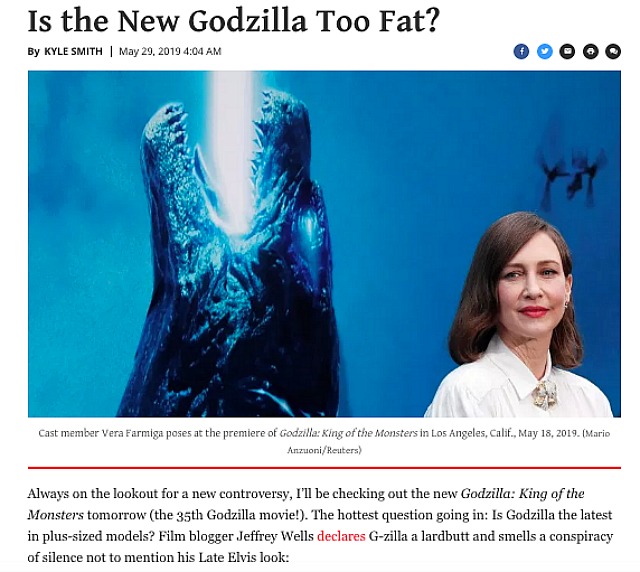
Match Made In Calculation
Nobody wanted to see John and Mary 50 years ago, and nobody except for those with a curious, Larry Karaszewski-like appreciation for oddly inert ’60s misfires will see it today.
The only way to catch this Peter Yates film is via YouTube [after the jump] or on a 12 year-old DVD.
That Time cover conveyed a very simple message: “You probably don’t want to see this film because you can tell at a glance that Dustin Hoffman and Mia Farrow don’t belong together…one look tells you they were paid to do this.” The trailer adds to this impression and then some.
Plus Farrow is red-haired and freckly-faced in the film but blonde and creamy-skinned on the Time cover. It all feels pushed, unnatural, lacking in urgency. In a word, inconsequential.

Fascinating Contrast
Consider these two clips of Francis Coppola. The first [starting at the 59-second mark] was shot by his wife Eleanor during the 1976 Philippine shoot of Apocalypse Now, when Coppola was 37 or 38. The second [after the jump] is a portion of last month’s Tribeca Film Festival discussion between an 80 year-old Coppola and director Steven Soderbergh, following the debut of Apocalypse Now: Final Cut.
One can’t help but note the stark differences — the aggressive energy and hyper-judgmental focus that Coppola had 42 years ago vs. the wiser, calmer, more long-viewish Coppola who intends to finally start shooting Megalopolis later this year or certainly by 2020.
The clips remind us that the combination of hunger, ambition and brash nerve are probably more vital when it comes to making a strong film than the application of seasoned wisdom and last-lap reflection. Directing is a young or middle-aged-man’s game. I’m not saying you can’t hang in there and deliver in your 60s, ’70s or ’80s, but by and large directors make their best films between their late 20s and mid 50s. Why? Because they’re more dogged, tenacious and determined during those decades.




